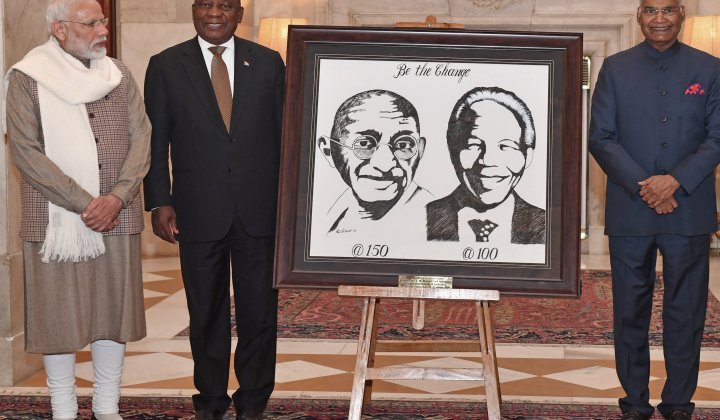Asia is home to more than half the world’s population (about 4.4 billion people) and responsible for 32% of global GDP (and that percentage continues to grow). Africa, on the other hand, which is home to just over 1 billion people, is responsible for only about 3% of global GDP. Kobus van der Wath, CEO of Axis Group International, a global procurement, international sales activation and cross-border advisory, believes that there is room to grow trade significantly between Africa and Asia – particularly China – in mutually beneficial ways. Having presented the Africa/China Masterclass at GIBS in October last year, he provides his thoughts on the opportunities and challenges of Africa/China business relations.
...we need to have a comprehensive view of China...
There are significantly different opinions on Africa’s relationship with China; some view China as a powerful partner while others believe China to be a threat. What is your perspective?
Firstly, China cannot be ignored. It has a US$13 trillion economy and makes up almost half of Asia’s US$30 trillion economy. It’s growing at a very high rate and competes across the product manufacturing complexity spectrum. At the top end, China competes with the USA, Germany and Japan, with India, Mexico, Bangladesh and Africa on the lower end. It is catching up with the top-end players and pulling ahead of lower-end countries. That means China is a special case as it can continue to outdo developing countries while catching up with developed countries.
I believe we need to look at China in a very comprehensive light. It must be viewed as a buyer, a potential market, an investor, a technology developer, and as a partner. It’s not just a country; it’s a construct we need to incorporate into our supply chain and value chain thinking, and competitive and industrial policies. While its per capita income is still low, its average annual growth is faster than any other large economy. It’s about 16% of the world economy, and together with India and Indonesia, it makes up about 51% of the emerging market wallet size.
For South African exporters, policymakers and scholars, we need to think about this and find ways to engage with China. The challenge, however, is to ensure that the alliance is mutually beneficial.
China and Africa have significant, although asymmetrical, trade relations. What opportunities do you see for growth, and specifically, where can Africa benefit?
Trade between Africa and China has been growing at close to 20% across imports and exports over the last 15 years or so and will continue to do so. Africa exports fuels, minerals, metals and agricultural and forestry products to China and imports machinery, textiles, chemicals and plastics. There are only a few countries that are significant exporters to China with many more importing from the country.
China is also very involved in our construction projects. Across Africa, 55% of all contract value sits in the hands of Chinese companies. It’s remarkable. But, how can we benefit from that? Can we subcontract to the Chinese because they are clearly the biggest and the best; can we be their engineering or project management partners? Or do we need to regulate construction? That will create political friction, but maybe it’s the right thing to do, although maybe it’s the wrong thing. Do we have a view? Are we even aware of this?
These statistics are aggregated. No individual country seems to be looking at the bigger picture but are all working on their own. We are not unified as Africa, so we don’t have Africa-wide policies, and individually, our economies are too small to sway things. On the other hand, China’s foreign direct investment into Africa has increased, as has Chinese loans to the continent. China is helping to industrialise Africa. Again, we need to have a comprehensive view of China.
It’s important to understand that different countries report on things differently. For example, in South Africa, we say we have a trade deficit with China, but we don’t count gold and a few of our other exports. If you look at how China reports, they include those things, and they see South Africa having a trade surplus. One can’t say either way is right or wrong – it’s just a different methodology.
China is no longer a plastic toy manufacturer...
The problem, however, is that we only export metals and minerals to China – 93% of all trade. Axis Group aims to help grow other areas of exports to create route-to-market solutions for South African wine, fruit, manufacturing, services, components, and so on. The Chinese market is there, and the country imports a little bit of everything. The Africa/China Masterclass was about growing awareness of these sorts of opportunities.
...China is not one large market, but many different markets...
Is the issue a lack of awareness of opportunities?
There are many potential reasons we’re not selling more, and we need to interrogate those: is our product not good enough, or is it too expensive? Have we already sold everything we produce somewhere else? Have we simply not explored selling to China?
The point is that there are so many areas where there is still room to benefit from trading with China. Yes, we can buy from China, but we must also market to China. We must be sure to attract investment from China. We must partner with Chinese firms in the rest of Africa and combine skills and capabilities. We need to understand the value chains to be able to compete.
China is no longer a plastic toy manufacturer, but rather a significant player that should be respected. They spend on R&D and infrastructure and we need to understand that, as well as details like the industrial clusters within the country.
Axis Group has looked at different growth opportunities within China, and where Africa could play a bigger role. Could you outline some of those?
At a very high level, we believe Africa should, of course, continue to export raw materials, but must also make the most of the changing economic structure in China. More trade in agriculture, food, manufacturing and value-added products must be developed. In my mind, the glass is half full. We can come together and develop a more calibrated approach to making the most of these opportunities. We can tap into e-commerce channels and trends if we put effort into understanding the Chinese consumer and industrial landscape. To get it right, you need a good but flexible strategy to understand the culture, and base decisions on decent analytics and solid due diligence. You need to become an insider.
We did an analysis and came up with 100 different key products across four tiers that could be framed better for export into China, and there are many areas where South Africa features.
You need to do a granular analysis. For example, exporting to developed eastern cities versus rural cities in western China may be a better option as the former may already be saturated. You need to understand China – its history, culture, politics and protocols, the rules and regulations – and adapt and be able to scale. You need to have a grip on channel management and business models.
Do you have any pointers for African companies looking to explore these opportunities?
Use good intermediaries, develop partnerships, and think about whether you need to go via an intermediary in Hong Kong, which used to be the case, or whether you can go direct. Understand what you will need to do in terms of marketing, brand-building and logistics. Also consider if using fair trades is best, or whether it would be better to fly to China with the Department of Trade and Industry when they go on a mission.
Importantly, you need to understand that China is not one large market but has multiple markets. Also, the regulatory environment and the way management decisions work in Chinese organisations differs to the way things work here at home. Be flexible and adapt your approach as you learn and get to understand the local needs and how to meet them.
Have the right people in your team and understand and leverage your strategic plan (for example, the geopolitical and bilateral trading ties between South Africa and China, or FOCAC, BRICS or the Asian Infrastructure Development Bank).
Finally, define your goal. Are you aiming for export revenue, cost reduction on imports, technology partnerships, sharing markets in Africa, or something else?




